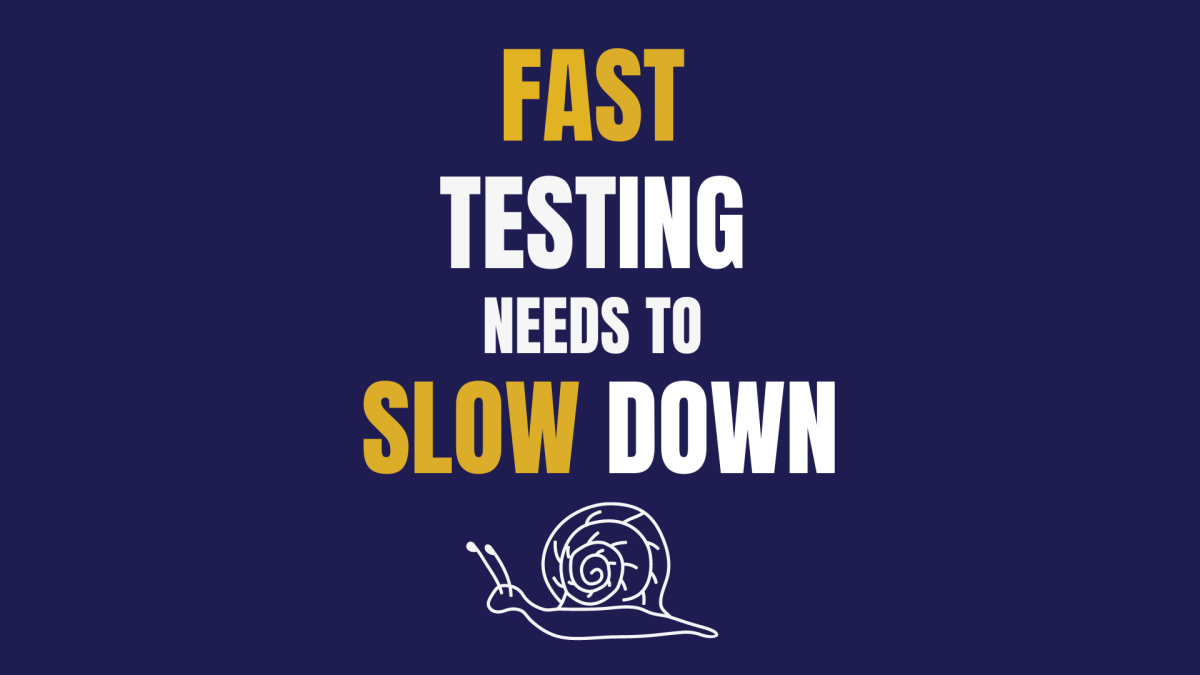The replacer of the Florida Statewide Assessment (FSA), the Florida Assessment of Student Thinking (FAST), has undergone some revisions despite the event’s recency. The Florida government has modified its standardized testing, this time they changed the algorithm and properties of the test itself.
The assessment now bases each question on the accuracy of previous questions and FAST tests. If the student scored a level three on their previous FAST, they get started with a question on that level. Once they click ‘Next’, the answer is submitted. If the student gets it correct, their next question is increasingly more difficult. If they get it wrong, they get an easier question.
“However, if you complete the test, if you move beyond any question and go back to change your answer, the original thing that you chose will be what is recorded as your score,” Stephen Lander, English 2 teacher, explained.
There was a slideshow distributed by the Florida Department of Education that teachers in the English department were shown during a faculty meeting, and then discussed the ramifications of those changes. This caused some adjustments to how teachers approached this reformed standardized testing.
Stephen Lander said, “I try to be as open as I can about the expectations and the algorithm that I know of on the test. It lets students be as prepared as they can be, and otherwise still try to reach the widest range of approaches we can.”
However, many students felt outraged and did not know how to take the news. Some thought the information should have been released earlier, and the alterations went ‘backward’ rather than ‘forward’.
“I think I was more shocked and surprised that they would change the testing features again because I was under the impression that we would have more accessibility to how we are answering questions and more strategies to answering these questions,” Sabrina Eddings, sophomore, stated.
Kylie Greca, sophomore, is baffled as to whether this is considered an improvement and wishes that a sense of normality would be retained. Greca prefers not to constantly change testing.
“It still seems to have the same premise, so I don’t really understand how it’s that much better for them [Florida Department of Education] and how much more data they’re collecting.”
Greca even compares FSA and FAST, noting how standardized testing still has not changed significantly, continuing their argument that testing is not necessarily improving, especially considering this new FAST change.
“With the FAST testing, I feel like it takes a lot of time out of the student students actually learning. But with FSA, they’re only recording it at the end of the year, so they can only see the amount of growth year to year, but not throughout the year where they can’t with the FAST testing”, they argued.
Andria Alexandrou, sophomore, felt there would be a gap and a drastic alteration in grades, ultimately unfair to the students taking it.
“It’s a bad change because it’s not accurately measuring the intelligence of students because if they skip a question, they are still thinking about it,” they said.
Kylie Greca has a similar opinion about this misrepresentation. They believe that everyone has a different test-taking strategy and that they should have the right to pursue those, even if they do not know the answer to a question immediately.
“If a student can go back and correct their answer, then it shows that they do know it, so I feel like that’s growth within itself,” Greca reasoned.
Andria Alexandrou, sophomore, believes that the ability to review questions is a crucial element when taking these types of exams. If these features are removed, Alexandrou thinks there is no use for buttons that click back to previous questions.
“They won’t give you those points [if you review], so shouldn’t be able to go back. They give you the passage anyway [on each question], so it’s not like I gotta go back to read it,” Alexandrou said.
Even Lander agrees with the students’ narrative that the new system will be unjust for certain types of students.
“It seems to be designed to offer some kind of equity, but it is probably going to disproportionately affect students based on their approaches to testing,” he stated.
Lander also noted a few days later, “The seniors took their PM2 yesterday, and there has been a significant difference in grades,” proving the point of what was suspected by the students.
Students, however, have given insight into how they will approach the FAST from now on. They may need to revise their test-taking skills to achieve a representational grade.
Sabrina Eddings suggested, “I think I would pick whatever answer I think is best, and there’s no point in going back and worrying over your answers, because you know you can’t get the points back if it is wrong.”
Andria Alexandrou gave a similar perspective on the topic, even mentioning that answering all the questions is more important than remaining on one question for too long.
Alexandrou recommended, “If you don’t know the answer, just choose the one you thought of immediately; what you think is the best, and move on, because you want to get them all. I mean, they’re going to count it wrong if you don’t answer anything anyways.”
Currently, there is not much information on the FAST test and how it functions. Stephen Lander and other English teachers are unsure of how this reform will affect the long-term and even how the grading works now. Although garnering mostly negative feedback, Florida and OHS will adapt to this new version of the assessment and learn how it operates to better prepare its students.













































Mallory • Apr 25, 2024 at 1:54 PM
I didn’t know this about the FAST until I read this article, which I think is really absurd. If they are going to make this kind of change, I think the teachers should be very clearly telling their students about it because I feel as though I have not been given a fair chance now. I usually like to go through the test one time, then go back and often change my answers and this system works very well for me. Learning about this new information, it’s no wonder my scores have been lower this year. I think this is a really bad system and I wish the FL Department of Education would stop making pointless changes that honestly have no positive impacts.
Hannah Aglio • Apr 5, 2024 at 6:51 PM
I think this story is very well written. It’s very thorough and captures the emotions of the students due to this testing change. I agree with what the students/teachers are saying regarding this topic. I believe it’s hard to constantly adapt for the type of test we take. We have started to learn how to take the test the way they want not actually gain knowledge from the assessments.
Tucker Johnson • Mar 7, 2024 at 11:56 AM
Line 20 is really well written and does a great job expressing students’ opinions. I like how many interviews that there are and I think it is cool how so many people share opinions. I do not like the changes as I agree with Greca about how the changes take away from learning as a large amount of time is spent testing or preparing to test